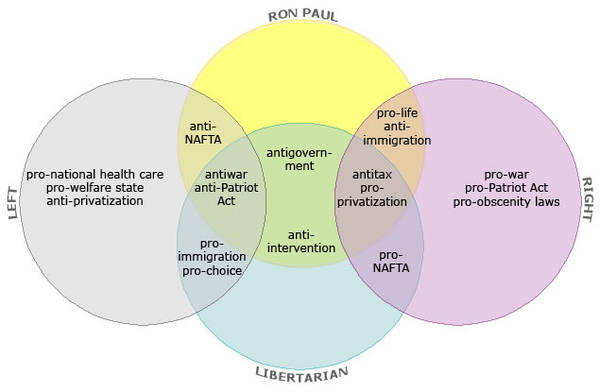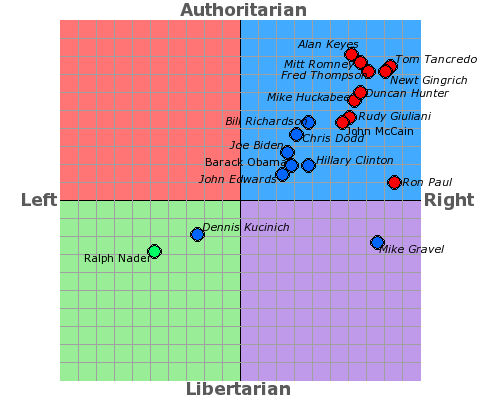Ron Paul is frequently portrayed as a "sensible" conservative and staunch libertarian, thus making him increasingly attractive as a presidential candidate. He's being strongly promoted to libertarians, conservatives fed up with Bush and the Christian Right, and Democrats dissatisfied with the current crop of Democratic candidates. At the same time, though, Ron Paul demonstrates the limits of wedding libertarianism with social and political conservatism. They simply don't mesh well.
Ron Paul's consistent anti-war position has made him popular, but how many people also understand his rejection of secularism and church/state separation? How many realize that his "states' rights" rhetoric is a mask concealing a desire to use the government to promote "traditional marriage" and criminalize abortion? Ron Paul is only a "libertarian" where and when it's convenient. Much of the rest of the time, he's not merely a social conservative but a religious conservative promoting an agenda very close to that of Christian Nationalists.
If Ron Paul were a serious contender for the presidency, he'd be a significant threat to American secularism and liberty. Fortunately, he seems to have about as much chance of getting elected as I do — but this doesn’t mean that his candidacy won't influence people for the worse. In particular, I'm concerned about people learning to accept anti-secularism while making excuses for him and their support of him. The first and most important step in preventing that is to examine his ideas now and explain not only how wrong they are, but also why they represent such a threat.
According to Ron Paul himself (via Brent Rasmussen)
Through perverse court decisions and years of cultural indoctrination, the elitist, secular Left has managed to convince many in our nation that religion must be driven from public view. The justification is always that someone, somewhere, might possibly be offended or feel uncomfortable living in the midst of a largely Christian society, so all must yield to the fragile sensibilities of the few.
It should be noted right at the beginning that Ron Paul consistently decries "secularism" and "secularists," though he more often uses the label "secular Left."
This, perhaps more than many of his arguments, makes it clear where stands: squarely and unambiguously against a secular government, secular laws, and a secular America. This helps put him in the same camp as the extremist Christian Right.
The second thing to note is that there isn't a single word in the above that's true. Ron Paul is employing a falsehood which has been very popular with theocrats of the Christian Right who seek to deceive voters about what secularism is and what the separation of church & state is all about. Ron Paul has either been duped by those deceivers, or he knows better yet is actively participating in the deception.
No one has launched any court cases seeking to drive religion "from public view." There have been no organized efforts to prevent people from promoting religion in public, from having religious images on their front lawns, or engaging in religious evangelism in the community. What's actually been happening is that people have tried to stop the "public," which is to say public funds and institutions, from promoting, supporting, or endorsing the religion of just some of the citizens. Usually those offering dishonest claims about this rely upon ambiguity in the word "public" (in public view vs. publicly funded), but Ron Paul doesn't even do this — his is an unambiguously false claim.
A true libertarian would support efforts to stop the government from funding and supporting one religion out of many. Libertarians believe in less government combined with private action, which is exactly what the "secular Left" is seeking to achieve in the context of religion. Libertarians believe that the scope of government action should be limited to only that which the Constitution authorizes — and when it comes to religion, the government is not authorized to do anything.
Ron Paul is not a libertarian when it comes to his own personal religious beliefs — he seems to believe that in a "largely Christian society," the government magically acquires the authority to promote and endorse Christianity. Of course, this means endorsing and promoting one particular version of Christianity out of all the possibilities. Ron Paul doesn't seem to mind this — or perhaps he supports it in the hopes that his form of Christianity will be the one favored?







